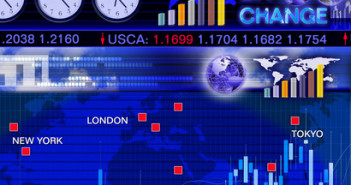The G7 and the USD/JPY dominate the overnight session as the markets and traders try to figure out exactly how the G7 feels about the Japanese currency. Initial statements yesterday allowed the JPY to weaken well above the 94.00 level, then the following statements saw the JPY strengthen to briefly trade below the 93.00.
So it is obvious that the G7 is concerned about the recent weakening of the JPY and that this will be a main topic at the G20 meeting in Moscow on Friday and Saturday. It has become apparent to all that other central bankers are not happy with Prime Minister Shinzo Abe’s active pursuit of JPY devaluation. There will be continued comments on this throughout the rest of the week and I would expect to see “whippy†moves in
USD/JPY. Technically, there is support at 93.20 and 93.00, with resistance at 94.00. I would be surprised if we rose that high, expecting 93.70 to be the near term top for the USD/JPY this week.
In Europe yesterday, ECB President Draghi addressed the comments regarding a “currency war†and stated that this fear was “way overdoneâ€. He also stated that the Spanish government would not be needing a bailout, which helped to strengthen the EUR. He also stated that EUR rates at the present time were appropriate and that the ECB continues to assess whether current appreciation has the potential to change the ECB’s risk assessment for price stability. These comments seemed to temper the ones he made last Thursday and have given the EUR some foundation. The currency has flirted with the 1.3485 resistance level. A break there will take the currency to the next level of resistance at 1.3510. Support for the EUR is now at 1.3460 and 1.3435.
Draghi may be dragged to the Italian elections
In other currency news, the AUD moved higher on news that Westpac consumer confidence rose 7.7% in February. The AUD had fallen below the 1.0300 level but has rebounded after this news and the fact that the USD is somewhat under pressure. USD/CAD eased as well but still remains above parity.
The days before a G7 and G20 meeting usually are filled with “tape bombsâ€, but given the volatility of yesterday’s comments, we may not see much more of that in the next day or so. Traders will now focus on the communique that will be sent at the conclusion of the meeting. Will Japan be outwardly sanctioned for their recent moves? Or will the central bankers ease up and issue a typical middle of the road statement about the importance of coordinated actions regarding currency movements. That remains to be seen.
President Obama delivered his State of the Union address last night and there wasn’t much reaction in the currency markets. In his speech he called for “a balanced approach to deficit reduction, with spending cuts and revenue, and everyone doing their fair shareâ€. The next fiscal deadline is March 27, when legislation that funds the federal government expires.
Forex Analysis: GBP/USD Reaches Downside Target with Further Bearish Bias



